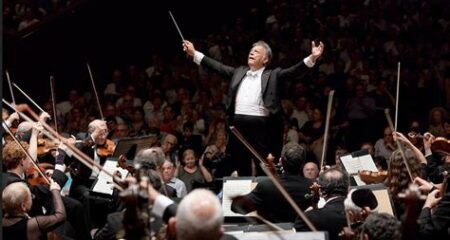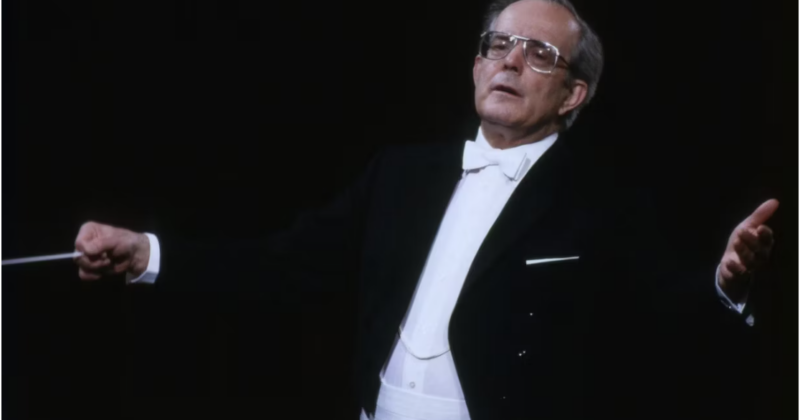Conductors
Conductors… a rare breed, seldom seen in captivity, nomadic in nature, often an enigma, at one moment a meek pencil-wielding teddy bear, at the next moment a fire-breathing dragon brandishing the sword of Siegfried, only to vanish between acts into their own personal cage, returning a half-hour later with neatly combed hair and a cleanly pressed shirt.
Friend or foe?
The answer is: neither nor. A great conductor is the friend of the music. If you want to be the conductor’s friend, be a friend of the music you are performing. It IS his/her job to hold the piece together through thick and thin, after all. Often the conductor has little to no rehearsal if taking over repertory in a large opera house. If this conductor is smart, they will NOT do anything unconventional or daring while doing any given piece. These ‘unsung hero’ conductors are often found as ‘Erster Kapellmeister’ at many middle and large opera houses in Europe. Often, in these positions, they don’t really get a proper chance to develop their own musical personalities, bound by constraints of ‘zero rehearsal’, preordained musical objectives, score cuts which have been pre-established, technical necessities, rehearsal scheduling, and a myriad of other issues over which they have little control, if any.
Should these conductors become music directors later on, they will then have the luxury of planning, picking & choosing what they will conduct, how many rehearsals they get, as well as negotiating how many performances they will be required to conduct per season. And they will then conduct these performances as THEY want them, ensuring that they have enough rehearsals for themselves. With luck, a star is born.

Discussions
What if you are rehearsing with a conductor and things aren’t going quite smoothly? Firstly, NEVER complain to the conductor in front of the orchestra. They will take it as a personal affront. Some will plot revenge. I once worked with a well-known mezzo-soprano who was singing Eboli in Don Carlo for the first time. During rehearsals she said she found the slow section of the ‘O Don Fatale’ quite slow. At the premiere, the conductor slowed it down and wound down the tempo so much that King Kong with three lungs could not have mastered it. She then paid dearly during the soaring climax at the end. Anything you have to say should be done privately, and it must always be your problem, never that of the conductor. I once jokingly remarked to a well-known conductor ‘
“You know, if you could cut 6 minutes off of the performance time, I’d make the earlier train.“ He said, “The bet is on”. At the next performance he looked at me, tapped his watch, and smiled. He actually cut 7 minutes off of it. I owe him a cold beer to this day. On another occasion, I was working with a young conductor who I had known since childhood, in a production of Carmen’ In rehearsal, he took the quintet so fast that none of us could spit out the text. I quipped, “You got a train to catch too?” Well, he turned white as a sheet. I was summoned then to him during the break, where he told me, “J*sus, don’t do that sh*t again, these guys don’t have any respect for me as it is.” He was right, of course, regarding my comment.
Another time, I was doing an unusual version of Don Carlo with a famous conductor I had worked with a number of times. The orchestra rehearsal started, and he entered the pit, and opened the score. His eyes bugged out, looking at an opening chorus which, as far as I know, was practically never performed, at least not in the Italian 5-act version. He picked a tempo out of his head which was as fast as the “Charge Of The Light Brigade”, totally unsuited to the mood of the piece. When he finished, he looked up and found me grinning at him, ear to ear. He rolled his eyes, shook his head, and we moved on. The next time around the tempo was solid. But I never said a word about it, although I knew him quite well.

The Concertmaster
In the darkest of hours, a first-rate concertmaster can be a beacon of hope. What if the conductor is somewhat inebriated? And if he/she becomes so enraptured with the music that their beat starts to resemble a grand mal seizure? Or they catch a glimpse of the television camera and begin to gesticulate soulfully as if they were painting the ceiling of the Sistine Chapel while fervently reciting Novenas? Not to worry. Every first-rate orchestra can play a standard piece without a conductor, if need be. These guys are JADED. They’ve seen it all and heard it all. Just follow his lead, and nobody will notice. If the conductor is stubborn regarding a tempo, have a word with the concertmaster. He’ll fix this for you, and the conductor will never be the wiser, although he or she may become frustrated. Only once, in many decades, was the situation so bad with the ‘Maestro’ that we needed two prompters, an assistant conductor in the centre prompters box, one on each side of the stage, and yet anotherin a cavern in the middle of the set. Mind you, this was in a major European opera house, and the conductor was quite well known, mostly in modern repertoire. To this day, I really have no idea what he was doing, and really didn’t pay that much attention. Another conductor, quite competent, was a somewhat portly soul who liked to wear a fairly roomy sort of black kaftan when conducting. While I’m sure it was comfortable, as it can get quite warm in the pit over the course of a few hours, I was often reminded of a large Emu desperately trying to take flight during the faster sections…
The Egomaniac
Every now and then, the dreaded egocentric enters the opera house. Their skills are, more often than not, not commensurate with their inflated view of themselves. I often wondered if they had the phone numbers of all of the great composers in their cell phones and spoke with them daily about the intricacies of their masterworks. Such conductors are poison to any theatre, looking upon all who play or sing as useless oafs to be chastised and beaten at every turn. Again, not to worry. I once experienced this sort of conductor, who may have been the most purposely rude individual I had ever run into in a theatre. In this large house, though, the orchestra had a reputation for not putting up with everything. During the intermezzo before the last act of Carmen, again, they started to play exactly as he was conducting. I thought that several of the first violins had simultaneously broken a string. He became much quieter for the entire run. Another was chastised by the orchestra and refused to appear for the final bows. Perhaps he was concerned that the standees tomatoes were still in the can…
Thankfully, these types of conductors are a small minority. Most conductors are serious about their work and want to deliver the best they can under any circumstances. A few stand out for me over the years, however: Guadagno, for his innate organic musicality, Silipigni for his strict attention to detail, Sawallisch for his magnificent Strauss and Wagner, Horst Stein for the most musically inspiring performance of Flying Dutchman I ever performed in, and Ralf Weikert for his precise readings of Rossini, ringing the bell every time. But there are many more, for instance Peter Schneiders dignified reading of ‘Parsifal’ or his spritely ‘Cosi fan tutte’.
Opinions expressed here are solely that of the author. No names of protagonists mentioned.


Absolutely great article but it could have been much, much greater if names would be mentioned.
Thank you sir. I think you’ll understand that I would rather not be sued for defamation!
Ja, even in de keuken kijken, leuk om te lezen.
Oh, how wonderful to read some honest comments about conductors! Great article.